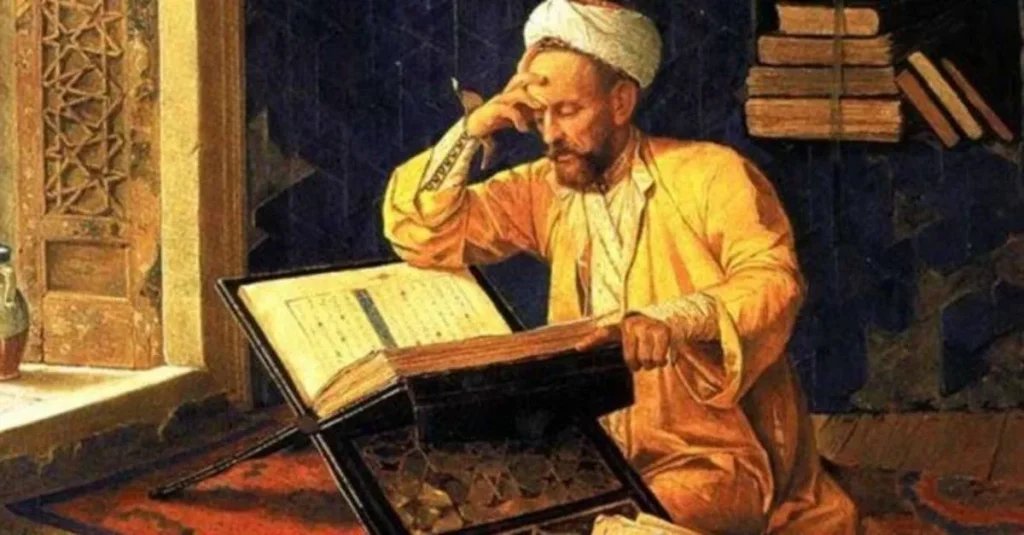
A of portrait of Imam Al-Ghazali
Islamic Theology and Metaphysics
Imam Al-Ghazali devoted much of his life to Islamic theology (kalam) [1]. He studied divine attributes, prophecy, and God’s nature deeply [2]. His aim was to defend orthodoxy using reasoned arguments [3].
He engaged with metaphysical questions about existence and causality [1]. Al-Ghazali examined philosophers who relied heavily on rationalism [2]. He sought to reconcile philosophical inquiry with Islamic revelation [3].
In his work Maqasid al-Falasifah, he analyzed philosophical approaches to existence [1]. He argued that ultimate truth comes from God alone, not human reason [2]. This became a foundational text for Islamic metaphysics [3].
Imam Al-Ghazali emphasized the limits of human reason [1]. While philosophy is valuable, divine revelation guides ultimate understanding [2]. He taught that metaphysics without spiritual insight is incomplete [3].
His theological writings also addressed moral and spiritual questions [1]. Ethics, the soul, and the afterlife were central topics [2]. He combined rigorous logic with deep spiritual reflection [3].
Imam Al-Ghazali’s contribution shaped subsequent Islamic theology [1]. Scholars studied his works to understand the balance between reason and faith [2]. His metaphysical insights remain influential in Islamic scholarship worldwide [3].
References
[1] Watt, W. Montgomery. The Faith and Practice of al-Ghazali. London: George Allen & Unwin, 1953.
[2] Griffel, Frank. Al-Ghazali’s Philosophical Theology. Oxford University Press, 2009.
[3] Smith, Margaret. Al-Ghazali: The Mystic. London: Luzac, 1944.
The Maturity of Imam Al-Ghazali’s Thought
Imam Al-Ghazali’s thought reached maturity after years of study and reflection [1]. He integrated philosophy, theology, jurisprudence, and spirituality [2]. This combination created a holistic approach to knowledge and life [3].
His work Ihya’ Ulum al-Din exemplifies this maturity [1]. It combines ethical guidance, spiritual insight, and legal principles [2]. The text shows his ability to balance rationality with devotion [3].
Imam Al-Ghazali reconciled conflicts between philosophy and Islamic law [1]. He addressed metaphysical questions without compromising faith [2]. This balanced perspective became a hallmark of his mature thought [3].
He emphasized self-awareness and moral responsibility [1]. Intellectual inquiry and spiritual discipline were inseparable in his worldview [2]. Knowledge without ethics, he taught, is incomplete [3].
Maturity also reflected in his teaching style [1]. He guided students to think critically while maintaining spiritual humility [2]. His approach inspired generations of scholars across the Islamic world [3].
Imam Al-Ghazali’s mature thought influenced Islamic philosophy, theology, and Sufism [1]. His works continue to be studied for insights into faith, reason, and spirituality [2]. This stage marked the culmination of his lifelong intellectual and spiritual journey [3].
References
[1] Watt, W. Montgomery. The Faith and Practice of al-Ghazali. London: George Allen & Unwin, 1953.
[2] Griffel, Frank. Al-Ghazali’s Philosophical Theology. Oxford University Press, 2009.
[3] Smith, Margaret. Al-Ghazali: The Mystic. London: Luzac, 1944.
Spiritual Journey of Imam Al-Ghazali
Imam Al-Ghazali’s spiritual journey began during his years of teaching in Baghdad [1]. Despite his fame, he experienced inner emptiness and doubt [2]. This led him to question worldly achievements and knowledge [3].
He decided to leave Baghdad in 1095 CE for solitude and reflection [1]. He sought spiritual purification and deeper understanding of God [2]. This period marked the start of his retreat and ascetic life [3].
During his retreat, he traveled to Damascus, Jerusalem, and Mecca [1]. He practiced strict devotion, prayer, and meditation [2]. These exercises strengthened his spiritual insight and inner peace [3].
Imam Al-Ghazali engaged deeply with Sufism, studying under experienced mystics [1]. He learned about self-discipline, humility, and love for God [2]. These teachings complemented his intellectual training [3].
His spiritual journey inspired his later writings, especially Ihya’ Ulum al-Din [1]. This work combines Islamic law, ethics, and mysticism [2]. It reflects the integration of knowledge and spiritual experience [3].
Imam Al-Ghazali’s journey shows that true understanding requires both reason and devotion [1]. His life became a model for integrating scholarship with spirituality [2]. Scholars and Sufis alike continue to study his methods [3].
References
[1] Watt, W. Montgomery. The Faith and Practice of al-Ghazali. London: George Allen & Unwin, 1953.
[2] Griffel, Frank. Al-Ghazali’s Philosophical Theology. Oxford University Press, 2009.
[3] Smith, Margaret. Al-Ghazali: The Mystic. London: Luzac, 1944.
Self-reflection and Moral Education
Imam Al-Ghazali (رحمه الله) emphasized self-reflection as the foundation of moral growth. He believed humans often overlook their inner faults. Self-awareness allows one to recognize weaknesses and virtues alike. By examining thoughts and actions, a person can correct moral lapses.
He stressed that education is not only intellectual but also ethical. Knowledge without moral discipline is incomplete. Learning should guide one to virtuous behavior. Al-Ghazali advocated constant self-examination to align actions with principles.
Moral education, according to Al-Ghazali, begins within the heart. One must nurture qualities like honesty, patience, and humility. External practices, such as rituals and study, support inner refinement. True learning shapes character, not just intellect.
He also introduced the concept of “muhasaba,” or accountability to oneself. Daily self-assessment strengthens conscience. It prevents arrogance and moral negligence. Al-Ghazali encouraged writing reflections and reviewing them regularly. This process deepens understanding of personal growth.
Teachers and mentors play a vital role in moral education. Al-Ghazali highlighted guidance, example, and correction as essential. A student observes the teacher’s conduct and integrates similar virtues. This combination of self-reflection and mentorship fosters balanced character development.
Spiritual disciplines enhance moral awareness. Practices such as prayer, meditation, and reading sacred texts refine the soul. Al-Ghazali connected inner purification with ethical living. One who cultivates self-awareness becomes resilient against temptation and ethical lapses.
In essence, self-reflection and moral education are inseparable. They empower individuals to act ethically in every sphere of life. Al-Ghazali’s teachings remain relevant for contemporary moral and spiritual guidance.
References:
- Imam Al-Ghazali, Ihya’ Ulum al-Din, Book of Knowledge and Self-purification.
- Makdisi, George, The Rise of Colleges, Oxford University Press, 1981.
- Hourani, George, Islamic Thought in the Classical Age, Cambridge University Press, 1983.






